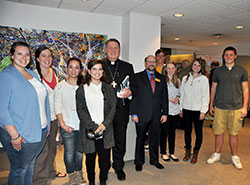Archbishop Tobin reflects on Church’s view of globalization

Archbishop Joseph W. Tobin and Professor Pierre Atlas, director of the Richard G. Lugar Franciscan Center for Global Studies at Marian University in Indianapolis, pose with global studies students on April 16 at Marian University. (Photos by Sean Gallagher)
By Sean Gallagher
For 10 years, the Richard G. Lugar Franciscan Center for Global Studies at Marian University in Indianapolis has hosted speakers from around the world to help broaden the vision of the students of the school sponsored by the Oldenburg Franciscans.
Archbishop Joseph W. Tobin, who lived overseas for more than 20 years and has traveled to more than 70 countries, was the final speaker in the center’s speaker series this year.
In his April 16 address, he explored the question of whether or not the Catholic Church is “a catalyst or obstacle to a better world.”
While acknowledging that Christ called his followers to be “salt for the Earth and light for the world,” Archbishop Tobin also noted that many people over the past two centuries have seen the Church as a force fighting against human development.
In contrast to this view, he pointed out that prominent social scientists who studied religion in the past few decades have noted the continuing influence of faith in society around the world.
From his own experience, Archbishop Tobin recalled his travels to Brazil, Northern Ireland and Kenya, and how he saw Catholics there working to promote peace and to supply basic human needs. He also noted that the Catholic Church is the largest worldwide provider of care to people with HIV/AIDS.
All of these anecdotes, Archbishop Tobin said, were motivated by an approach to those in need by Christians that is arguably “more radical” than that offered by the world’s other monotheistic religions—Islam and Judaism.
“In Jesus, God identifies himself with those to whom service is given or refused,” said Archbishop Tobin, referring to Jesus’ comparison of himself to “the least of these” in Matthew 25. “In our behavior toward others is, finally, our behavior toward God.”
For much of his presentation, Archbishop Tobin explored the Catholic Church’s views on globalization, an economic phenomenon that shows the “increasing interdependence of the human family” around the world.
“We’re linked whether we want to recognize it or not,” Archbishop Tobin said. “We’re linked in ways that predicate the wealth of one country frequently on the impoverishment of another.”
Referring to the teachings of both St. John Paul II and retired Pope Benedict XVI, Archbishop Tobin said that Catholic social teaching can provide a good balancing effect in globalization, allowing for both individual initiative in business and the care for the common good.
“If you want the Catholic social doctrine in a nutshell,” he said, “it’s to be of service of the human person, to serve the dignity of individuals, and, at the same time, preserve solidarity and the common good.”
Archbishop Tobin went on to explain that Catholic social teaching looks at the interdependence fostered by globalization, and calls for it to be marked by “respect for the equal dignity of persons and [the generation of] reciprocal connections that enable persons to share in the common good.”
Archbishop Tobin also explored how Pope Francis, in his apostolic exhortation “Evangelii Gaudium” (“The Joy of the Gospel”), sets forth principles that can foster this balanced view of globalization. The pontiff does this specifically in the third part of the document that is dedicated to “the common good and peace in society.”
The first principle is that “time is greater than space” (#222-225). In this principle, Archbishop Tobin explained that Pope Francis favors the passage of time leading to fullness over the limitations of a particular moment in time.
“I think what he is calling the Church and suggesting to the world is that social justice isn’t instant tapioca—just add water and you have it,” Archbishop Tobin said. “Rather, it’s a struggle across time. But it’s a struggle that is not without hope because we are struggling to make God’s dream come true for human beings.”
The second principle is that “unity prevails over conflict” (#226-230). Archbishop Tobin said that people sometimes ignore conflicts or become a prisoner to them. Pope Francis, he said, offers a third way to deal with them—“ ‘the willingness to face conflict head on, to resolve it and make it a link in a chain of a new process’ ” (#227).
The third principle is that “realities are more important than ideas” (#231-233).
Quoting Pope Francis, Archbishop Tobin said, “ ‘Realities are greater than ideas. This calls for rejecting the various means of masking reality—angelic forms of purity, dictatorships of relativism, empty rhetoric, objectives more ideal than real, brands of ahistorical fundamentalism, ethical systems bereft of kindness, intellectual discourse bereft of wisdom’ ” (#231).
Finally, Pope Francis’ fourth principle is that “the whole is greater than the part” (#234-237).
“ ‘We need to pay attention to the global so as to avoid narrowness and banality’ and, I would also say, racism,” said Archbishop Tobin, quoting Pope Francis. “ ‘Yet we also need to look to the local, which keeps our feet on the ground’ ” (#234).
“I think what can help us and will help us Catholics and non-Catholics build a better world together is what Francis calls the ‘culture of encounter,’ that we meet each other doing good,” Archbishop Tobin said in concluding his presentation. “We decide to act, not first on the basis of what divides us, but to find common ground, common agreement in creating a better world.”
Professor Pierre Atlas, director of Marian’s global studies center, was impressed with Archbishop Tobin’s presentation.
“His analytical approach was very much like a social scientist, even though he came at it from a faith perspective,” said Atlas. “It was a high level intellectual discussion. He was talking about what we talk about in political science.
“He was a perfect speaker to cap off our 10th year of the series.” †
